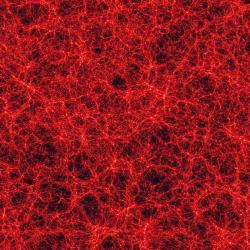 Thanks to Einstein, we know that matter and energy are just different versions of one another. E=mc2 tells you how much energy you’d get if you converted mass into energy. Don’t try, it’s hard. Physicists were concerned that all matter in the Universe would eventually decay into radiation after trillions and trillions of years of time.
Thanks to Einstein, we know that matter and energy are just different versions of one another. E=mc2 tells you how much energy you’d get if you converted mass into energy. Don’t try, it’s hard. Physicists were concerned that all matter in the Universe would eventually decay into radiation after trillions and trillions of years of time.
But the impact of dark energy, a mysterious force accelerating the expansion of the Universe, might change those predictions for the fate of matter. Physicists Lawrence Krauss and Robert Scherrer recently published a paper in the journal Physical Review D that predicts that the ratio between matter and radiation should remain roughly the same as dark energy continues to spread the Universe apart.
Right now we can see most of the Universe, but as it continues to expand, distant objects will appear to be moving away from us faster than the speed of light, and will disappear from view. In 10 trillion years from now, only our local cluster of galaxies will be visible. Krauss and Scherrer have calculated that new radiation created from decaying matter will be diluted as soon as it’s created, thanks to dark energy.
As particles decay into radiation, the dark energy will increase the separation between photons, decreasing their energy and density in the Universe. The clumps of matter that remain will still dominate.
Original Source: Vanderbilt University News Release
